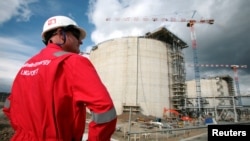Russian President Vladimir Putin has handed full control over a major oil and natural gas project partly owned by Shell and two Japanese companies to a newly created Russian firm, a bold move amid spiraling tensions with the West over Moscow's military action in Ukraine.
Putin's decree late Thursday orders the creation of a new company that would take over ownership of Sakhalin Energy Investment Co., which is nearly 50% controlled by British energy giant Shell and Japan-based Mitsui and Mitsubishi.
Putin’s order named “threats to Russia’s national interests and its economic security” as the reason for the move at Sakhalin-2, one of the world’s largest export-oriented oil and natural gas projects.
The presidential order gives the foreign firms a month to decide if they want to retain the same shares in the new company.
Russian state-controlled natural gas giant Gazprom had a controlling stake in Sakhalin-2, the country's first offshore gas project that accounts for about 4% of the world’s market for liquefied natural gas, or LNG. Japan, South Korea and China are the main customers for the project's oil and LNG exports.
Kremlin spokesman Dmitry Peskov said Friday that there is no reason to expect a shutdown of supplies following Putin’s order.
Shell held a 27.5% stake in the project. After the start of the Russian military action in Ukraine, Shell announced its decision to pull out of all of its Russian investments, a move that it said has cost at least $5 billion. The company also holds 50% stakes in two other joint ventures with Gazprom to develop oil fields.
Shell said Friday that it’s studying Putin's order, which has thrown its investment in the joint venture into doubt.
“As a shareholder, Shell has always acted in the best interests of Sakhalin-2 and in accordance with all applicable legal requirements,” the company said in a statement. “We are aware of the decree and are assessing its implications.”
Seiji Kihara, deputy chief secretary of the Japanese cabinet, said the government was aware of Putin's decree and was reviewing its impact. Japan-based Mitsui owns 12.5% of the project, and Mitsubishi holds 10%.
Kihara emphasized that the project should not be undermined because it “is pertinent to Japan’s energy security,” adding that “anything that harms our resource rights is unacceptable.”
“We are scrutinizing Russia’s intentions and the background behind this,” he told reporters Friday at a twice-daily news briefing. “We are looking into the details, and for future steps, I don’t have any prediction for you at this point.”
Asked during a conference call with reporters if Putin's move with Sakhalin-2 could herald a similar action against other joint ventures involving foreign shareholders, Peskov said, “There can't be any general rule here.” He added that “each case will be considered separately.”
Sakhalin-2 includes three offshore platforms, an onshore processing facility, 300 kilometers of offshore pipelines, 1,600 kilometers of onshore pipelines, an oil export terminal and an LNG plant.




